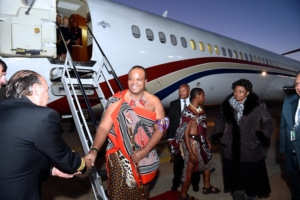Protests in Eswatini, Africa’s Last Absolute Monarchy
 Eswatini, formerly known as Swaziland, is a country in sub-Saharan Africa that has been dealing with protests for weeks. The pro-democracy protests in Eswatini are against the rule of King Mswati III, who has been criticized for his lavish lifestyle.
Eswatini, formerly known as Swaziland, is a country in sub-Saharan Africa that has been dealing with protests for weeks. The pro-democracy protests in Eswatini are against the rule of King Mswati III, who has been criticized for his lavish lifestyle.
Poverty in Eswatini
In 2018, Swaziland changed its name to Eswatini. It borders South Africa and Mozambique. According to NPR, the country is Africa’s last absolute monarchy, and political parties are banned there. The ruler of the country is King Mswati III, who has reigned since his coronation in 1986.
King Mswati III has received heavy criticism for living in luxury while nearly two-thirds of Eswatini’s population of 1.2 million live in poverty. This gaping inequality is one of the reasons for the current pro-democracy protests in Eswatini.
Additionally, more than 330,000 people in Eswatini struggle with food insecurity. The country is still reeling from COVID-19 and a 2016 drought that ravaged the country’s food supply. Most of its people face poverty while their king lives in splendor.
Pro-Democracy Protests in Eswatini
Over the past few weeks, protests have broken out in Eswatini. People have rallied in opposition to the monarchy, and specifically the king. They are also expressing displeasure about restrictions on political expression and the poor state of the economy.
The protests have also caused immense damage both to the country and its people. At least 40 people have died, and more than 150 protestors have been taken to hospital with injuries. Additionally, violence and looting have caused a lack of basic necessities for many citizens. Protestors are calling for greater political participation, a limit on the monarchy’s power and a popular election for a Prime Minister instead of an appointment by the king.
Light in the Darkness
However bleak the forecast may seem for the protests in Eswatini, there is a ray of hope. Following the social unrest in Eswatini and South Africa, female religious leaders organized a Day of Prayer for their countries to heal.
The Leadership Conference of Consecrated Life in Southern Africa (LCCLSA) organized an online Day of Prayer. The event encouraged participants to pray for peace, healing and an end to the violence. Some people also shared testimonies of how the violence has affected them and their families, allowing for collective healing.
“Though painful and sad to listen to, the testimonies proved to be inspiring and gave a glimmer of hope in the midst of the hopelessness that people are feeling,” Sr Nkhensani Shibambu, President of LCCLSA, told Vatican News. “Many people were moved and touched by the initiative and felt inspired to begin the rebuilding of the country from the ashes that had surrounded them in the past weeks.”
While protests ravage Eswatini, highlighting the inequity between the lavish lifestyle of King Mswati III and the two-thirds of citizens living in poverty, there is hope in people coming together to pray for healing and a better future for the country.
– Laya Neelakandan
Photo: Flickr
